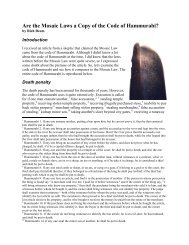Coming to Grips with the Early Church Fathers - Evidence for God ...
Coming to Grips with the Early Church Fathers - Evidence for God ...
Coming to Grips with the Early Church Fathers - Evidence for God ...
You also want an ePaper? Increase the reach of your titles
YUMPU automatically turns print PDFs into web optimized ePapers that Google loves.
<strong>Coming</strong> <strong>to</strong> <strong>Grips</strong> <strong>with</strong> <strong>the</strong> <strong>Early</strong> <strong>Church</strong> Fa<strong>the</strong>rs’ Perspective on Genesis John Millam<br />
followed by <strong>the</strong> “soul” consisting of moral principles; and lastly <strong>the</strong> “spirit” representing <strong>the</strong><br />
deeper meaning that is brought out by allegorical interpretation. When <strong>the</strong> plain literal (“body”)<br />
interpretation seemed absurd, it indicated that <strong>the</strong> reader needed <strong>to</strong> look beyond it using<br />
allegorical (“spiritual”) interpretation. While this mystical approach may seem extreme or<br />
unnecessary, it did serve <strong>to</strong> apply <strong>the</strong> text <strong>to</strong> people’s current situations and concerns. Today, we<br />
might call this method “contemporary application.” 14<br />
The early church saw <strong>the</strong> entire Old Testament as being about Jesus Christ. Every detail—not<br />
just specific prophecies—could be viewed as serving as a type or symbol of Jesus Christ. Along<br />
<strong>with</strong> a variety of o<strong>the</strong>r nonliteral devices, allegorical interpretation served as a way <strong>to</strong> uncover<br />
hidden Chris<strong>to</strong>logical meanings. For example, scriptural references <strong>to</strong> wood were sometimes<br />
seen as prefiguring <strong>the</strong> cross of Christ.Most of <strong>the</strong> church fa<strong>the</strong>rs (not just <strong>the</strong> allegorically<br />
inclined ones) viewed <strong>the</strong> Old Testament through a Chris<strong>to</strong>logical lens. We see this, <strong>for</strong> example,<br />
in Hilary of Poitier’s Homilies on <strong>the</strong> Psalms, where he views <strong>the</strong> psalms as primarily being<br />
about Jesus Christ and so downplays <strong>the</strong>ir original his<strong>to</strong>rical context. 15<br />
Allegorical interpretation went on <strong>to</strong> dominate <strong>the</strong> <strong>the</strong>ology of <strong>the</strong> Middle Ages. It was <strong>the</strong><br />
Protestant Re<strong>for</strong>mers who ultimately rejected it in favor of a literal (i.e., plain meaning)<br />
approach. They likewise specifically rejected Augustine’s instantaneous creation view even<br />
though <strong>the</strong>y were deeply indebted <strong>to</strong> him in most o<strong>the</strong>r areas. I wholeheartedly agree <strong>with</strong> <strong>the</strong><br />
Re<strong>for</strong>mers on <strong>the</strong>se points. If allegorical interpretation is <strong>the</strong>re<strong>for</strong>e <strong>to</strong> be rejected, does this<br />
invalidate Augustine’s challenge <strong>to</strong> <strong>the</strong> calendar-day interpretation and, <strong>the</strong>re<strong>for</strong>e, lend<br />
credibility <strong>to</strong> Mook’s <strong>the</strong>sis that <strong>the</strong> church fa<strong>the</strong>rs were predominantly young-earth creationists?<br />
No, it does not.<br />
Legitimate (non-allegorical) concerns<br />
While we should not follow <strong>the</strong> specific interpretations of <strong>the</strong> allegorical fa<strong>the</strong>rs, <strong>the</strong>y do provide<br />
some valuable insights in<strong>to</strong> Genesis 1 that are worth considering. In particular, <strong>the</strong>y identified at<br />
least three scriptural arguments that seem <strong>to</strong> rule out <strong>the</strong> idea that <strong>the</strong> creation days could be<br />
ordinary solar days. 16<br />
1. Nature of <strong>the</strong> first three creation days. If <strong>the</strong> Sun, Moon, and stars were not created<br />
until <strong>the</strong> fourth creation day (as popularly unders<strong>to</strong>od by <strong>the</strong> church fa<strong>the</strong>rs), <strong>the</strong>n what<br />
was <strong>the</strong> nature of <strong>the</strong> first three creation “days”? 17 How could <strong>the</strong>y be ordinary solar days<br />
if <strong>the</strong> Sun did not yet exist? This question provoked more discussion and disagreement<br />
among <strong>the</strong> early church fa<strong>the</strong>rs than any o<strong>the</strong>r part of Genesis 1. Philo, Origen, and<br />
Augustine saw this as clear proof that at least <strong>the</strong> first three days could not be ordinary<br />
14. Robert I. Bradshaw, Creationism and <strong>the</strong> <strong>Early</strong> <strong>Church</strong>, last updated January 25, 1999,<br />
http://www.robibrad.demon.co.uk/Contents.htm, chapter 1. Bradshaw comes from a young-earth perspective<br />
but provides a well-documented and balanced look at <strong>the</strong> early church.<br />
15. Philip Schaff and Henry Wace, eds. Nicene and Post-Nicene Fa<strong>the</strong>rs, second series vol. 9 (Peabody, MS:<br />
Hendrickson Publishers, 2004), 235.<br />
16. The allegorists were not <strong>the</strong> only ones <strong>to</strong> identify <strong>the</strong>se problems. Celsus, a critic of Christianity, made use of<br />
<strong>the</strong>se verses <strong>to</strong> try <strong>to</strong> discredit Genesis. Origen wrote Against Celsus <strong>to</strong> respond <strong>to</strong> <strong>the</strong> skeptic’s claims.<br />
17. This belief that <strong>the</strong> Sun, Moon, and stars were created <strong>for</strong> <strong>the</strong> first time on creation day four is a common error<br />
due <strong>to</strong> a lack of understanding of <strong>the</strong> original Hebrew. For a detailed explanation, see Rodney Whitefield, “The<br />
Fourth ‘Day’ of Genesis,” http://www.creationingenesis.com/TheFourthCreativeDay.pdf.<br />
Page 6 <strong>Evidence</strong> <strong>for</strong> <strong>God</strong> from Science






